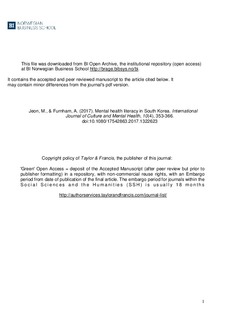| dc.contributor.author | Jeon, Mina | |
| dc.contributor.author | Furnham, Adrian | |
| dc.date.accessioned | 2017-12-19T14:36:16Z | |
| dc.date.available | 2017-12-19T14:36:16Z | |
| dc.date.created | 2017-11-30T14:41:03Z | |
| dc.date.issued | 2017 | |
| dc.identifier.citation | International Journal of Culture and Mental Health. 2017, 10 (4), 353-366. | nb_NO |
| dc.identifier.issn | 1754-2863 | |
| dc.identifier.uri | http://hdl.handle.net/11250/2473044 | |
| dc.description.abstract | The study aimed to examine the Korean public’s recognition of mental disorders, attitudes towards mental disorders and knowledge and beliefs about professional or self-help for mental disorders. In all 253 participants were presented with case vignettes describing bulimia nervosa, bipolar disorder, substance addiction, depression, schizophrenia, OCD, ADHD, anorexia and social phobia. Participants were asked to identify described mental disorders in the vignettes, to rate each character’s adjustment to live with the mental problems and to rate the likelihood of suggesting several types of help for each character. Participants noted their previous history of exposure to mental disorders. Substance addiction was recognized the most (80.2%) and anorexia the least (10.7%). Participants responded the psychologist/psychiatrist’s help the most helpful. Of the nine mental disorders, the recognition of six mental disorders were significantly predicted by predictors included in this study, and amongst the factors, higher level of education was found to be the most significant predictor for high recognition of mental disorders. Compared to other countries, Korean’s ability to recognize mental disorders was poorer than British and there was difference between South Korean and other Eastern countries in terms of ability to recognize mental disorders even if they share similar culture. Limitations of this study were recognized | nb_NO |
| dc.language.iso | eng | nb_NO |
| dc.publisher | Taylor and Francis | nb_NO |
| dc.rights | Navngivelse-Ikkekommersiell 4.0 Internasjonal | * |
| dc.rights.uri | http://creativecommons.org/licenses/by-nc/4.0/deed.no | * |
| dc.title | Mental health literacy in South Korea | nb_NO |
| dc.type | Journal article | nb_NO |
| dc.type | Peer reviewed | nb_NO |
| dc.description.version | acceptedVersion | nb_NO |
| dc.rights.holder | 'Green' Open Access = deposit of the Accepted Manuscript (after peer review but prior to publisher formatting) in a repository, with non-commercial reuse rights, with an Embargo period from date of publication of the final article. The embargo period for journals within the Social Sciences and the Humanities (SSH) is usually 18 months | nb_NO |
| dc.source.pagenumber | 353-366 | nb_NO |
| dc.source.volume | 10 | nb_NO |
| dc.source.journal | International Journal of Culture and Mental Health | nb_NO |
| dc.source.issue | 4 | nb_NO |
| dc.identifier.doi | 10.1080/17542863.2017.1322623 | |
| dc.identifier.cristin | 1521022 | |
| dc.description.localcode | 1, forfatterversjon | nb_NO |
| cristin.unitcode | 158,4,0,0 | |
| cristin.unitname | Institutt for ledelse og organisasjon | |
| cristin.ispublished | true | |
| cristin.fulltext | postprint | |
| cristin.qualitycode | 1 | |

